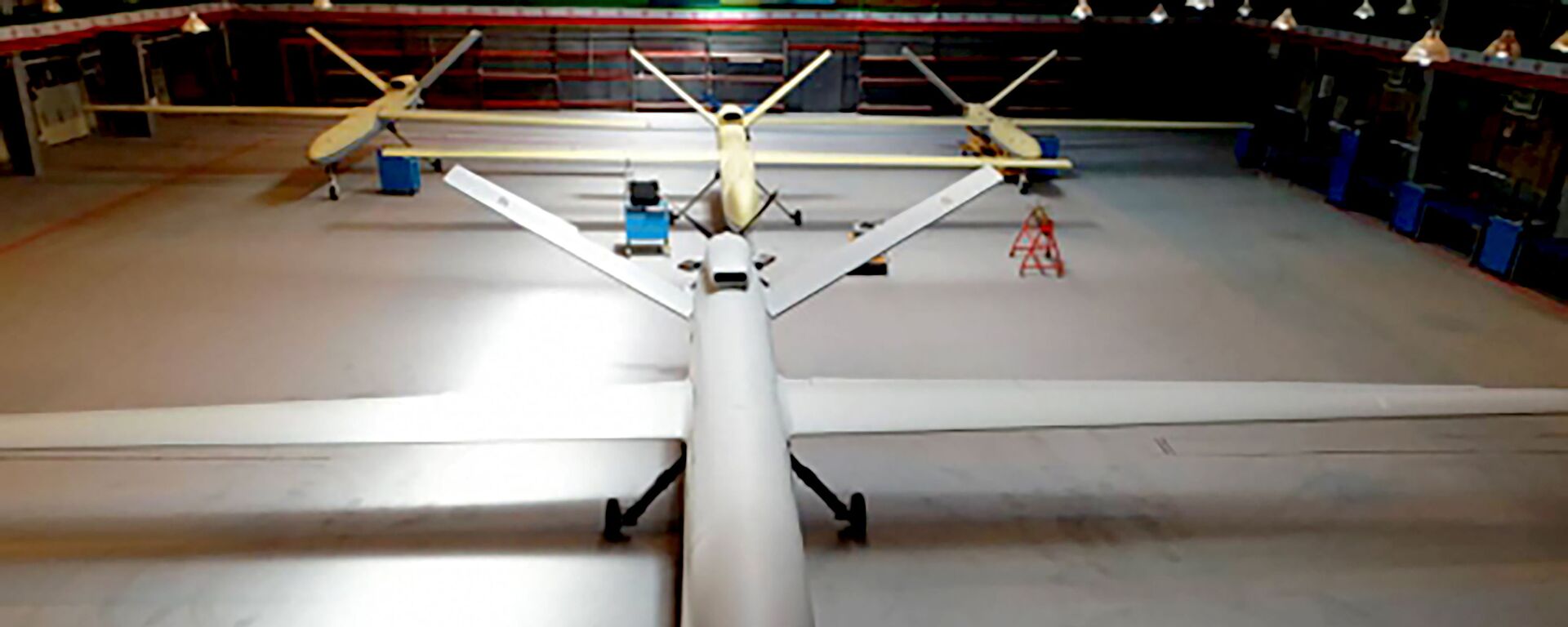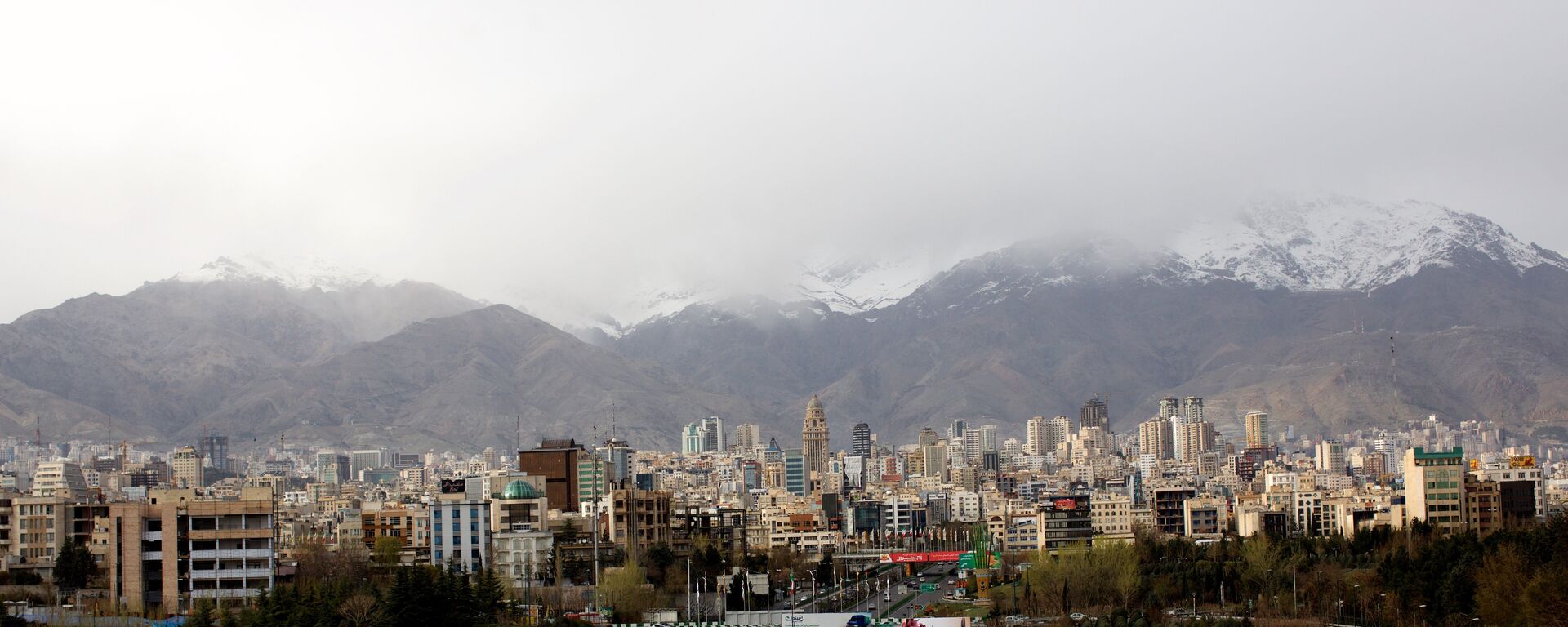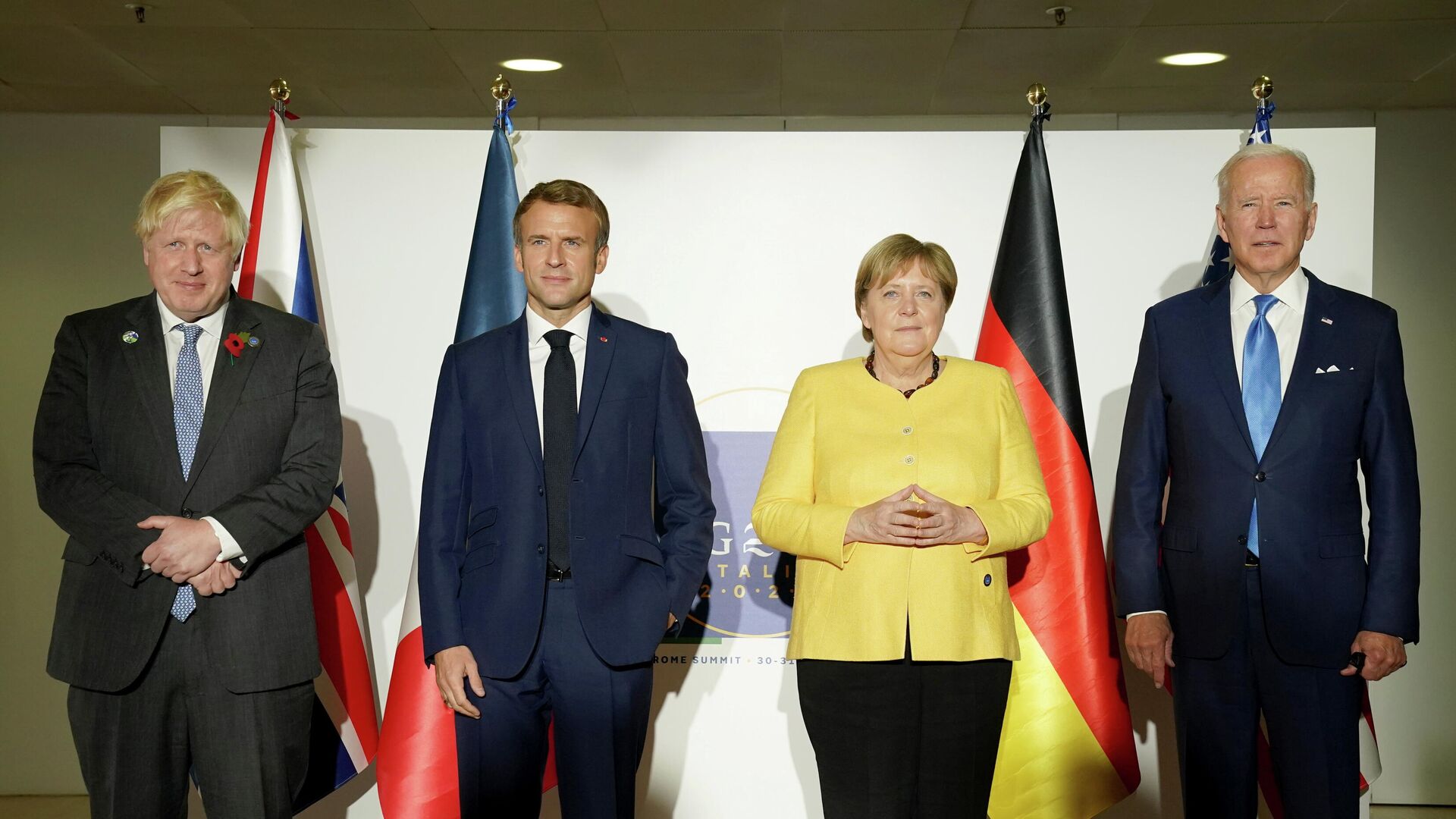https://sputnikglobe.com/20211030/us-e3-express-grave-concern-about-irans-nuclear-programme-say-up-to-tehran-to-change-course-1090348999.html
US, E3 Express 'Grave Concern' About Iran's Nuclear Programme, Say Up to Tehran to 'Change Course'
US, E3 Express 'Grave Concern' About Iran's Nuclear Programme, Say Up to Tehran to 'Change Course'
Sputnik International
Iran’s Foreign Ministry blasted Washington on Friday over new sanctions targeting the Islamic Republic’s drone industry, suggesting the restrictions contradict... 30.10.2021, Sputnik International
2021-10-30T16:49+0000
2021-10-30T16:49+0000
2023-07-31T16:57+0000
france
britain
america
iran
germany
joint comprehensive plan of action (jcpoa)
iran nuclear deal
https://cdn1.img.sputnikglobe.com/img/07e5/0a/1e/1090349376_0:0:3309:1861_1920x0_80_0_0_05efca7c6247ce79f7bb2f28c5d61c56.jpg
President Joe Biden and the leaders of the three Western European JCPOA members France, Germany, and the UK have alleged that Iran’s nuclear activities pose a threat to international security.The communique alleged that Tehran’s enrichment activities “had no credible civilian need,” but were “important to nuclear weapons programmes,” and went on to accuse the country of reducing cooperation with the International Atomic Energy Agency. “We agreed that continued Iranian nuclear advances and obstacles to the IAEA’s work will jeopardise the possibility of a return to the JCPOA,” the statement warned.European leaders praised President Joe Biden’s “clearly demonstrated commitment to return the US to full compliance with the JCPOA and to stay in full compliance, so long as Iran does the same,” and said that a return to the agreement remained possible and could be done quickly.The four leaders added that they were “committed to continuing to work closely” with the JCPOA’s other signatories – Russia, China, and the European Union, “in resolving this critical issue.”The US-E3 communique comes a day after the US Treasury slapped new sanctions on Iran targeting four individuals and two companies associated with the country’s drone programme over the alleged export of Iranian unmanned aerial vehicles abroad.Iranian Foreign Ministry spokesman Saeed Khatibzadeh slammed Washington over the new restrictions, suggesting the situation “reflects the completely contradictory behaviour of the White House, [which] speaks of its intention to return to the nuclear accord and continues to impose sanctions.”The drone-related sanctions are the latest in a series of over 1,000 restrictions imposed on Iran by Washington in recent years, targeting everything from the country’s oil and gas exports, to the Middle Eastern nation’s efforts to procure food and medical supplies abroad. In addition to affecting Iran itself, the restrictions also threaten foreign nations, including US allies, and warn them not to do business with the Islamic Republic on penalty of financial and regulatory punishment.The sanctions come amid months of efforts by Tehran and Washington to kick-start JCPOA negotiations in Vienna, which have been stalled since June. On Wednesday, Iran’s top nuclear negotiator announced that the country would be ready to rejoin the Vienna talks sometime next month. The same day, State Department spokesman Ned Price said the Biden administration still believes it’s possible to “quickly reach and implement an understanding on a return to mutual full compliance” with the nuclear deal.Before nuclear negotiations were frozen, Iran and the US each agreed “in principle” on the need for Washington to lift its crushing sanctions in exchange for an Iranian return to the uranium enrichment and stockpiling limits outlined by the JCPOA. However, the two sides disagree on which country should take the first step, with Tehran suggesting that America lift its “illegal” sanctions, and Washington saying the Islamic Republic must return to full compliance on enrichment.Additionally, Iran has also expressed concern about US efforts to add a clause into the JCPOA on Iran’s missile programme and its ‘regional activities’. After unilaterally pulling out of the nuclear agreement in 2018, President Donald Trump similarly suggested the creation of a “better deal” including Iran’s missiles and regional policies. Tehran vocally rejected these overtures, stressing that its conventional missile programme is its main deterrent against foreign aggression, and emphasising that its foreign policy would not be dictated by foreign powers.The Islamic Republic has long maintained that it does not have and has never had any plans to build a nuclear weapon, or any other weapons of mass destruction. The country eliminated its chemical weapons stocks in the mid-1990s before joining the Chemical Weapons Convention, and never used its arsenal during the Iran-Iraq War of 1980-1988, in spite of repeated Iraqi chemical attacks against Iranian troops and cities.
https://sputnikglobe.com/20211029/iran-says-new-sanctions-contradict-us-claims-about-seeking-to-return-to-nuclear-deal-1090323720.html
https://sputnikglobe.com/20211028/message-in-hebrew-iranian-general-says-enemy-plot-to-wreak-havoc-in-tehran-foiled-1090282219.html
france
britain
iran
germany
Sputnik International
feedback@sputniknews.com
+74956456601
MIA „Rosiya Segodnya“
2021
News
en_EN
Sputnik International
feedback@sputniknews.com
+74956456601
MIA „Rosiya Segodnya“
Sputnik International
feedback@sputniknews.com
+74956456601
MIA „Rosiya Segodnya“
france, britain, america, iran, germany, joint comprehensive plan of action (jcpoa), iran nuclear deal
france, britain, america, iran, germany, joint comprehensive plan of action (jcpoa), iran nuclear deal
US, E3 Express 'Grave Concern' About Iran's Nuclear Programme, Say Up to Tehran to 'Change Course'
16:49 GMT 30.10.2021 (Updated: 16:57 GMT 31.07.2023) Iran’s Foreign Ministry blasted Washington on Friday over new sanctions targeting the Islamic Republic’s drone industry, suggesting the restrictions contradict US officials’ claims about their willingness to return to the Joint Comprehensive Plan of Action (JCPOA) nuclear deal.
President Joe Biden and the leaders of the three Western European JCPOA members France, Germany, and the UK have alleged that Iran’s nuclear activities pose a threat to international security.
“We expressed our determination to ensure that Iran can never develop or acquire a nuclear weapon and shared our grave and growing concern that, while Iran halted negotiations on a return to the JCPOA since June, it has accelerated the pace of provocative nuclear steps, such as the production of highly enriched uranium and enriched uranium metal,” Biden, Emmanuel Macron, Angela Merkel and Boris Johnson said in a
joint statement Saturday after a meeting in Rome on the sidelines of the G20 summit.
The communique alleged that Tehran’s enrichment activities “had no credible civilian need,” but were “important to nuclear weapons programmes,” and went on to accuse the country of reducing cooperation with the International Atomic Energy Agency. “We agreed that continued Iranian nuclear advances and obstacles to the IAEA’s work will jeopardise the possibility of a return to the JCPOA,” the statement warned.
European leaders praised President Joe Biden’s “clearly demonstrated commitment to return the US to full compliance with the JCPOA and to stay in full compliance, so long as Iran does the same,” and said that a return to the agreement remained possible and could be done quickly.
The joint statement warned Tehran that the lifting of US sanctions would “only be possible if Iran changes course,” and urged President Ebrahim Raisi “to seize this opportunity and return to a good faith effort to conclude our negotiations as a matter of urgency.”
The four leaders added that they were “committed to continuing to work closely” with the JCPOA’s other signatories – Russia, China, and the European Union, “in resolving this critical issue.”
The US-E3 communique comes a day after the US Treasury
slapped new sanctions on Iran targeting four individuals and two companies associated with the country’s drone programme over the alleged export of Iranian unmanned aerial vehicles abroad.
Iranian Foreign Ministry spokesman Saeed Khatibzadeh slammed Washington over the new restrictions, suggesting the situation “reflects the completely contradictory behaviour of the White House, [which] speaks of its intention to return to the nuclear accord and continues to impose sanctions.”

29 October 2021, 18:24 GMT
The drone-related sanctions are the latest in a series of over 1,000 restrictions imposed on Iran by Washington in recent years, targeting everything from the country’s oil and gas exports, to the Middle Eastern nation’s efforts to procure food and medical supplies abroad. In addition to affecting Iran itself, the restrictions also threaten foreign nations, including US allies, and warn them not to do business with the Islamic Republic on penalty of financial and regulatory punishment.
The sanctions come amid months of efforts by Tehran and Washington to kick-start JCPOA negotiations in Vienna, which have been stalled since June. On Wednesday, Iran’s top nuclear negotiator announced that the country would be ready to rejoin the Vienna talks sometime next month. The same day, State Department spokesman Ned Price said the Biden administration still believes it’s possible to “quickly reach and implement an understanding on a return to mutual full compliance” with the nuclear deal.
Before nuclear negotiations were frozen, Iran and the US each agreed “in principle” on the need for Washington to lift its crushing sanctions in exchange for an Iranian return to the uranium enrichment and stockpiling limits outlined by the JCPOA. However, the two sides disagree on which country should take the first step, with Tehran suggesting that America lift its “illegal” sanctions, and Washington saying the Islamic Republic must return to full compliance on enrichment.

28 October 2021, 15:04 GMT
Additionally, Iran has also expressed concern about US efforts to add a clause into the JCPOA on Iran’s missile programme and its ‘regional activities’. After unilaterally pulling out of the nuclear agreement in 2018, President Donald Trump similarly suggested the creation of a “better deal” including Iran’s missiles and regional policies. Tehran vocally rejected these overtures, stressing that its conventional missile programme is its main deterrent against foreign aggression, and emphasising that its foreign policy would not be dictated by foreign powers.
The Islamic Republic has long maintained that it does not have and has never had any plans to build a nuclear weapon, or any other weapons of mass destruction. The country eliminated its chemical weapons stocks in the mid-1990s before joining the Chemical Weapons Convention, and never used its arsenal during the Iran-Iraq War of 1980-1988, in spite of repeated Iraqi chemical attacks against Iranian troops and cities.





